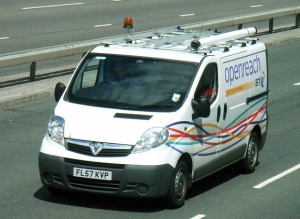BT speeds up fibre super-fast broadband rollout

BT has moved up its deadline for delivering fibre-based super-fast broadband, saying it will connect two-thirds of UK homes and businesses by the end of 2014, a year earlier than originally planned.

BT's super-fast broadband rollout has gone so well that company says it will hit its target of two-thirds of UK homes and businesses connected a year earlier than expected. Photo credit: didbygraham/Flickr
On Monday, BT said it is recruiting 520 extra engineers, many of them ex-soldiers, to help speed up the rollout. It is also bringing forward around £300m of its £2.5bn total investment to meet the revised deadline.
"Our rollout of fibre broadband is one of the fastest in the world, and so it is great to be ahead of what was an already challenging schedule," BT chief Ian Livingston said in a statement. "The acceleration reflects the success of the programme to date and is testament to the hard work and innovation of our people. We are investing when others are merely talking about it."
According to Livingston, the extra engineers will make sure that BT is ready to extend the rollout, should it be granted a chunk of the Broadband Delivery UK (BDUK) funding aimed at connecting rural areas.
BT's plans mean 16 million homes will have access to super-fast broadband by the end of 2014. Six million are already covered, and BT said next year will see that total taken to 10 million.
By way of contrast, Virgin Media said in July that 6.5 million homes could access its up-to-100Mbps cable product, although its latest financial results indicated that only 187,000 customers were actually taking Virgin's services of 50Mbps or above.
Culture secretary Jeremy Hunt welcomed BT's news, saying it is "vital" British homes and businesses have access to super-fast broadband as soon as possible.
"With access to super-fast broadband, UK businesses will have the infrastructure they need to grow and develop new products and services," Hunt said, according to the BT statement. "This investment means new jobs today, but also allows us to build the digital infrastructure we need for the jobs of tomorrow."
BT expected to see a lower amount of deployment work in 2015, the year originally planned for the final phase of the rollout, a spokesman for the telecoms giant told ZDNet UK. This, plus the fact that the rollout so far has gone "better than expected", meant it was viable to bring the work forward, he said.
FTTP product
Also on Monday, BT confirmed it has set its wholesale fibre-to-the-premises (FTTP) product live. This means ISPs that resell BT's connectivity can start offering their customers speeds of up to 110Mbps, as long as those customers have fibre going all the way to their homes or businesses, rather than just to the street cabinet. However, none of those resellers have as yet announced FTTP products based on BT's infrastructure.
BT's FTTP services were scheduled to arrive this summer. However, the company ran into difficulties with technical issues such as blocked ducts and had to delay the deployment.
At the start of October, BT said its FTTP services will hit speeds of up to 300Mbps next year. At the moment, the only towns seeing those speeds are the places where BT has been conducting FTTP trials: Ashford, Bradwell Abbey, Highams Park, Chester South, St Austell and York.
The vast majority of BT's fibre rollout is based on fibre-to-the-cabinet (FTTC) technology, which uses existing copper connections between the cabinet and customer premises and is therefore slower than FTTP. Its FTTC services currently reach up to around 40Mbps, and the company has said it will roughly double those speeds in 2012.